 |
|
 |
2010
July
28-31
|
End-of-July news roundup
There is major good news about U.S. copyright law.
I'm still digesting it, but basically, both
a court decision
and
a set of regulatory decisions
have weakened the infamous
Digital Millennium Copyright Act.
Bottom line: It is no longer illegal to crack a copy protection or DRM scheme
unless you are thereby violating the copyright in some other way (i.e., making
copies for others). It is perfectly legal to crack copyright protections in
order to use something that you already have permission to use.
There is a
proposal to revive
Popular Electronics magazine. Go for it!
Yet another reason not to give life insurance to a child —
it can burden
them with a nasty income tax surprise later.
Insurance that "builds up a cash value" is a bad deal.
You come out way ahead by buying term insurance (much cheaper) and
putting the difference in the bank or a mutual fund.
Use your insurance for insurance and your investments for investments.
Further, children don't need life insurance. They don't have
dependents. Old people don't need life insurance either, for the same
reason. Life insurance is something you need temporarily, while you
have dependents, and during that time, you need lots of it. It is not
something you buy once for life.
I'll see you in August!
Permanent link to this entry


|
2010
July
27
|
A bargain for AT&T cell phone customers

Soon after taking this picture, my Nokia 6085 cell phone died, losing the ability
to see the SIM card. Cleaning contacts didn't fix it. The SIM card worked in
another phone. So I headed to Wal-Mart, and came out with a new phone for under $40.
We've known for some time that if you have a regular AT&T subscription,
you can buy an AT&T GoPhone (their pay-per-use deal) and move your existing
SIM card into it. This gives you a heavily subsidized (or at least not heavily
marked up) price on a low-end cell phone.
What's new is that AT&T now tells you that this is explicitly permitted.
It's on a sticker inside the package.
No more twinges of conscience; now I can be sure that it's intentional that
GoPhones work with regular AT&T accounts (and pre-existing GoPhone accounts).
They have apparently even applied a bonus to my account, although how that will work
is a little unclear.
(Technically, the old Nokia is still a low-end digital camera, MP3 player, and sundry
other things — it just won't make phone calls. I got the pictures off it with
the data cable. Anybody want a Nokia ex-telephone?)
Minor annoyance: Samsung has changed their charger connector since the last
time I had a Samsung, so I have to buy all new car chargers and the like. And I had
just bought new Nokia chargers and batteries. Fortunately, Melody and Sharon
are still using Nokias.
Permanent link to this entry


|
2010
July
26
|
Shopping, or running the gauntlet?
I was in a "big box" hardware store this afternoon, and all the employees
were obviously being paid by how many times they accosted customers and
offered help. I was accosted about ten times on my way from one side of
the store to the other. It gets ridiculous when an employee asks you,
"Are you finding everything you need?" and a second employee 15 feet away
and 15 seconds later asks you the same thing, and there are more than
half a dozen of them in toto. It felt almost like
running the gauntlet.
Part of the American big-store shopping experience — one of the parts
I like — is being left alone with my thoughts just a bit, while I plan
projects or purchases. I wouldn't
mind getting a friendly smile from 10 employees in rapid succession, but
having to answer direct questions from each of them was a bit discomfiting.
It reminds me of waitresses who think they're so charming
(or, perhaps, just so pressed for time) that I must look
away from Melody and interrupt myself in mid-sentence to give them my
full attention the instant they pop up tableside. No... That's not
how I got to be happily married for 28 years. Nor is it good for the digestion.
(Hmmm... In the case of the big-box store, I wonder if they had some other reason
for wanting to get a good look at me. Do I look like a notorious shoplifter?)
Thought for the day: The more people say "you know," the less anyone
knows what they're trying to say.
Permanent link to this entry


|
2010
July
25
|
Happy anniversary, Melody!
28 years!
Permanent link to this entry


|
2010
July
24
|
How to pronounce names of stars,
constellations, lunar and Martian features...
My book,
Celestial
Objects for Modern Telescopes,
gives the pronunciation of every foreign name in the book,
including star names.
There are no phonetic symbols — instead, I indicate pronunciations
with mock English words.
Click here to
see examples.
Permanent link to this entry
Civilizing Notepad++
If Notepad++ is bothering you with incessant notifications of
trivial updates, go to the Plugins menu and choose
Show Plugin Manager, Settings, and uncheck "Notify of Plugin Updates at Startup."
Permanent link to this entry
Sharon's latest project
Sharon still plays with dolls — and modifies them, decorates them,
and makes their clothes — and creates things
like this.
(In Internet Explorer, click on the picture to make it full-size.)
Permanent link to this entry


|
2010
July
23
(Extra)
|
How to pronounce Antonin Becvar (Antonín Bečvář)
[Revised.]
To hear how to pronounce the name of the famous Czech astronomer,
whose name when written without accent marks is Antonin Becvar,
click here.
With accent marks — and I'm not sure if your computer can display this —
it is Antonín Bečvář.
The marks over the C and the R make a considerable difference to the pronunciation.
The marks over the I and the A indicate vowel length, not accent.
Roughly, Bečvář is pronounced "betch-varsh." Now you know.
Aren't you glad that there is one amateur astronomer out there who
has a Ph.D. in linguistics?
Permanent link to this entry


|
2010
July
23
|
Before you give away that computer...
At home, we just gave an old (but working) computer to Goodwill,
which actively solicits them.
At work, we're sending quite a few computers to Surplus Property.
In both cases we are taking care to erase the hard disks so
that we aren't giving away data along with machines!
That is harder than it looks, for several reasons.
- When you delete a file, it doesn't go away. The space is marked as unoccupied,
but the data is still there, in the unoccupied space.
(And no, I'm not talking about the Recycle Bin. Even after you empty the Recycle Bin,
the free space on the disk still contains the data that used to be there.)
- Formatting a disk in the "quick" way doesn't write over the old data.
It just marks everything as unoccupied. Low-level formatting is so slow
that we seldom do it.
- Even after the old data is written over, a sufficiently determined spy can
still read it. (The CIA reportedly does this.) Recall that disk data consists
of ones and zeroes. These signals can be read as analog values. If you get an 0
that is shifted slightly toward what a 1 ought to be, then you know it was
written on top of a 1. Similarly, if you get a 1 that is shifted slightly
toward 0, you know it was written on top of a 0.
So here's what I recommend.
Most of the time, you should erase the whole disk (and then reinstall Windows
if needed — but we don't do this). For this purpose,
use DBAN. Download the file, burn it to CD,
and you have a bootable CD. Put the bootable CD into the doomed computer and boot from it.
It will find, and overwrite, all the data on all the hard disks. It normally makes
three passes — all zeroes, all ones, and random data — which is surely enough.
If you want to leave Windows in place, then make triple-sure you've deleted
all your data files; delete all the user accounts except one; make sure that account is
named Administrator or Owner and has no password, so that the next person can get in;
and use SDELETE
to overwrite all the blank space on the disk.
Those techniques are good enough for civilian life. If your PC really has national defense secrets,
or other extremely sensitive data (maybe including medical records), the only solution is to
destroy the hard disk with a drill press, sledgehammer, or what have you.
Above all, though, don't give away a computer that has your personal financial data or
passwords on it, even if it would take some effort for the bad guys to get the data.
Permanent link to this entry


|
2010
July
22
|
Econ-observation
From Feldstein via Mankiw:
Deliberate
tax breaks are
exactly the same thing as government spending.
Each is a transfer of money from the government to individuals,
either by the government paying it out,
or by the government refraining from collecting what it would normally collect.
That's why I hope the silly Georgia "sales tax holidays" will go the way of the dodo bird.
They are simply a transfer of money to people who go shopping on particular days.
Why should shopping on particular days be subsidized?
Permanent link to this entry


|
2010
July
21
(Extra)
|
[Updated.]
Unexplained slowness of a USB disk drive
Repeated Event 11 and 51 on a USB disk drive
The driver detected a controller error on \Device\Harddisk...
An error was detected on device \Device\Harddisk... during a paging operation
Here are some answers about my USB disk drive problem. I am not sure there was
anything wrong with any of the disks. It was a USB problem.
Symptoms: Backups on a USB-attached hard disk became slower and slower, then started
failing altogether, with messages that the drive was not ready. The drive sometimes acted
as if it had been removed and reattached, with the Autoplay window popping up and offering
to display files and pictures. The computer was very slow. But almost all of the time
there was no difficulty (other than slowness) accessing the files.
If you don't look at the event logs, you may not know anything is wrong — your USB disk drive
will just run slowly and slow down the whole computer.
In the error logs (accessed by right-clicking on Computer, Manage, Event Viewer, Windows Logs, System),
I saw this:
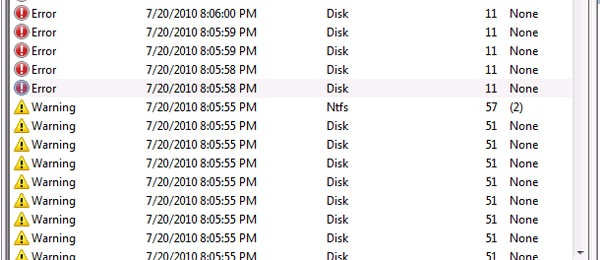
Note: If you get events like these and it's not a USB drive, don't read on.
You have a failing disk drive; replace it.
Note also: A few Event 11's at the moment the drive is attached or removed can be normal.
You are looking for Event 11's occurring in the middle of normal use.
Yet another note: It is normal to get a string of four or five Event 11's when the drive
goes into sleep mode. If you never have more than five in a row, and they're not constant,
you probably don't have a problem — especially if you can deduce the length of the sleep timeout cycle.
But in my case the drive was OK, and
this was a USB problem. I still don't know if it was hardware or device drivers.
But the key is, I had to do two things:
- Add new USB ports on a PCI card, and use them instead of the original ones.
- Either deactivate the on-motherboard USB ports or set them to USB 1.1 (slow).
Why the second step was necessary, I have no idea. It took me a long time to get
around to trying it.
It is very common for on-motherboard USB ports to be physically damaged.
They are subjected to a lot of static electricity as people plug things in and unplug them.
I am wondering if, in this case, one of the signal voltages or impedances is slightly off
in a way that only impedes prolonged high-speed USB 2.0 data transmission.
But whatever was wrong, it affected USB 2.0 performance on all USB ports
until the on-motherboard ones were deactivated.
Another word to the wise:
I've been told that Seagate Free Agent drives have a
sleep mode (power-saving mode) worthy of Rip Van Winkle,
and that can cause long backups to fail.
It can be disabled using Seagate's software provided with the drive.
Permanent link to this entry


|
2010
July
21
|
Short note from the trenches
Covington's law of diagnosis is, "You can have more than one thing wrong with you."
It now appears that my recent skirmish with USB disk drives was the result of two things wrong.
I think I did get a defective disk or two. (At least, I returned them to the store in good faith,
and they need to go to the manufacturer so that they can be low-level formatted, to get rid of all
traces of my data, before anyone else gets them.)
But the other problem is that the USB adapter on the motherboard (Asus P4PE) is out of spec somehow,
probably static-damaged (as i/o ports often are).
I'm in the process of converting the computer entirely to USB ports on a card, and apparently,
the new disk drives are going to be OK. But it has been a time-consuming puzzle, and I'm not
quite ready to declare victory and withdraw. I'll post more news when the problem is
completely solved.
Permanent link to this entry


|
2010
July
20
(Extra)
|
Rumor control: Sharon is not dead!
We just got a worried phone call... apparently a rumor is going around the
Internet that Sharon has died. Definitely not! She's right here, as alive
as can be, and we can't think of anything that would have sparked the rumor.
Permanent link to this entry


|
2010
July
20
|
Setting up SunTrust in Quicken
After a long hiatus, I again have Quicken downloading all my bank
accounts automatically. The secret to getting SunTrust to work involves
all the following facts:
- One-time failures to connect to SunTrust are common. Don't let that put
you off; just retry.
- SunTrust is known to Quicken by three names depending on the kind of
connection you want. In my case, "SunTrust Bank" was wrong and "SunTrust Bank - Web Connect"
was right.
- In Edit Account, check for incorrect information. In my case I had entered only a partial
account number when setting the account up manually. That kept Quicken from ever making a
correct connection.
- To troubleshoot, you can go to File, New Quicken File, New File, and set up a new file called TEST
and then set up the new account in it. That's what I did.
- To fix up an account that's partly incorrect, first completely deactivate it from One Step Backup.
Then don't reactivate it that way. Instead, go to File, New Quicken File, New Account, and set it up
as a new account, and then, when prompted, identify it with an account already there.
Incidentally, I continue to get excellent service from SunTrust, and I don't buy the common
doctrine that "big banks are bad and small banks are good". One or two "giant monster
mega-banks" — especially one up north — are very bad. Small banks, in my experience,
range all the way from excellent to terrible. I sometimes need things that a small bank would have
trouble with, such as international transfers. And my ATM card definitely has to work in England.
Permanent link to this entry


|
2010
July
19
|
Miscellany
Econo-news: People are
staying unemployed longer
than in normal recessions.
(Click to see an informative graph and commentary.)
What I pick up from listening to financial radio shows
is that many people have a
strong expectation that they'll get their old job back
(or one just like it) if they wait long enough.
But the point of the Great Recession is that we are not going to
get our old economy back — we were, after all, trying to make twice
as many cars and houses as anybody wanted.
Heed Peter F. Drucker's advice: people live longer than careers
and you will probably have more than one career.
Is syllabus a real word?
My old friend Grady Lacy points out that syllabus
(which nowadays means 'course outline')
originated as a misreading
of a Greek word in a manuscript of Cicero. It's the Latin form of a Greek word
syllabos which appears never to have actually existed in Greek.
It was taken to mean something like 'table of contents' when the Greek original,
apparently a casualty of bad handwriting, actually said sittybas 'book labels.'
So does this mean syllabus isn't legitimate? My response is that if its origin
is dubious, it has nonetheless been adopted into a good family.
It certainly could have been a Greek word — syllabos follows Greek grammar
perfectly, has to be a close relative to syllabé 'unit,' derived
from the same root. Syllabus is certainly a real word in Church Latin
nowadays; it means 'summary' or 'checklist.'
And we can't be sure that syllabos
never existed in Greek; all we know is that it doesn't occur in surviving ancient literature.
(Not even Du Cange's Lexicon mediae et infimae graecitatis.)
The same thing might happen to English words in the future.
What if summarization didn't survive but summarize did?
Should future scholars then declare that summarization wasn't a word?
Permanent link to this entry


|
2010
July
18
|
How to stop a USB or FireWire disk drive
from doing anything special when attached or opened
My only quarrel with my new Seagate Free Agent disk drives is that they want to
start up their own software (a simplified backup utility) when I click on them.
Similarly, some disk drives want to start special software whenever they're attached
to the computer. (It's a marketing thing; Windows isn't good enough; every disk drive
has to have its own special software included. It reminds me of the era when every
book had to have a CD bound into it.)
Here's how to "tame" a disk drive so it will act like a plain disk drive.
The operation is reversible.
Look for a file called autorun.inf in the root folder of the drive.
If you don't see it, go to Tools, Folder Options, View, and tell Windows
to show hidden files and system files (two checkboxes). Then you'll see it.
Rename autorun.inf to autorun.inf.bak.
If you ever want to undo the operation, rename it back to its original name.
Permanent link to this entry


|
2010
July
17
|
Clare College Choir is coming
 You heard it here first —
the choir of Clare College, Cambridge
(which is one of my almae matres)
will be performing in Athens, Georgia, on September 16,
and in Atlanta on September 17.
Stay tuned for details.
You heard it here first —
the choir of Clare College, Cambridge
(which is one of my almae matres)
will be performing in Athens, Georgia, on September 16,
and in Atlanta on September 17.
Stay tuned for details.
This is one of the best chapel choirs in the world.
Listen to them
here and,
if you like Christmas music in July,
here.
Clare College is the origin of
"Shepherd's Pipe Carol,"
now a popular Christmas carol
that was composed by our music director, John Rutter, back in the 1970s.
Now imagine getting to hear that choir at church every morning for a whole year.
That was my privilege in 1977-78.
Permanent link to this entry
A Windows Backup half-truth
Some .VHD files are mountable, some aren't
I had been told that the .VHD files made by Windows 7 Backup (system image backup, not file backup)
could be mounted (accessed) as virtual disks in Disk Manager.
So I tried it. Backing up a drive that had an unnamed boot partition, a partition for drive C,
and a partition for drive D, I got two .VHD files. I had to change permissions in order to read them.
When I did, I found I could mount them both but only the second one, comprising drive D, was
readable. The other had no drive letter, presumably because it started with an unnamed partition.
If I wanted to pursue doing backups this way, I'd probably give a drive letter to the unnamed boot
partition. Instead, I downloaded Acronis True Image, which I highly recommend.
It's on sale for $29 per license.
Permanent link to this entry


|
2010
July
16
|
Not "out for the summer"
The time has come to remind my avid readers that, even though I work for a
university, I am not "out for the summer."
(Nor retired, nor independently wealthy and idle, as a few people way out there appear
to imagine.)
Thanks to a research grant, I'm employed full-time right now.
As time permits, I'm also doing consulting projects.
Please bear with me if I have to turn down requests and invitations!
Permanent link to this entry


|
2010
July
15
|
The case of the woefully slow disk drive
We recently rearranged our computer network, and I needed a good way
to back up the new server, so I bought two
Western
Digital "Elements" 2.0-terabyte USB hard disks.
I put Windows 7 Backup to work, making a system image (VHD) of each of my two computers,
each with about 400 GB of data.
One finished in 3 hours. The other was still going after 30 hours, less than half through.
Thinking I had hit some terrible bug in Windows Backup, I downloaded the competing Acronis product
(much more versatile) and set it going.
After an hour, it said it had more than 49,000 days to go!
At that point I looked at the system log. The slow disk drive was reporting error 11 (controller failure)
every few seconds. Presumably, each time, it made the computer wait about half a minute before acceping
any more data.
The apparently normal drive has also reported the same error a couple of times.
So they're both going back to the store,
but before returning them, I'm using
sdelete
to wipe at least the first few percent of each drive,
so that nothing that I had stored on them will be easy to recover.
Bottom line: I wish Windows would tell us
(on the screen, not just in the logs)
when there are repeated errors
indicating hardware failure!
[Update: They may not have been defective at all. Click here.]
Permanent link to this entry


|
2010
July
14
|
Handy Windows feature of the day
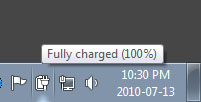
If you buy an APC UPS, and you plug its USB cable into your Windows 7 computer,
you don't need to install any UPS software. Windows will automatically recognize
the UPS as its power source and will treat it just like the battery and charger
of a laptop.
Permanent link to this entry


|
2010
July
12-13
|
State revenue spiked before it plummeted
[Revised.]
The governor's office has released a graph that I was in the process
of constructing for myself, explaining the terrible financial shape
that the state government is in:
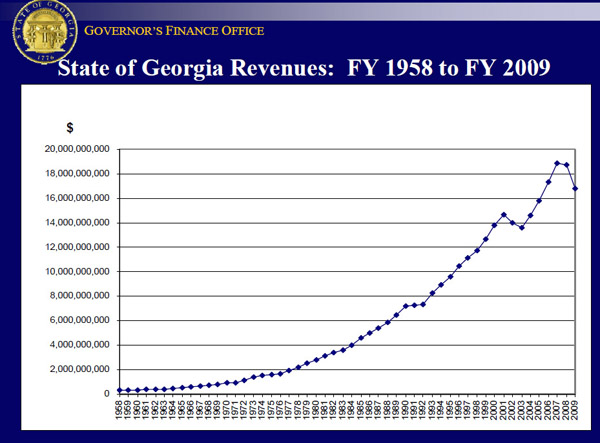
Their point is that revenue has fallen sharply.
But what the graph really reveals, in my opinion, is that
revenue spiked suddenly in 2006-07 and hasn't maintained that level.
If you fit a smooth curve to the whole graph, you see that 2004-07 was an
abnormally
fast rise.
Anyone who follows the stock market knows that any sudden change
is likely to be followed by a "correction."
If the state government had not assumed that
the rapid rise would keep speeding up, they might not have had to
furlough us last year. We had more revenue in 2009 than in 2005,
and we didn't have any trouble running the University in 2005.
[Addendum: For FY 2010, which has just ended, revenue was $14.2 billion,
which is farther below the level you'd expect from the overall trend.
I'm not denying that there's a recession. I'm just pointing out that there
was unreasonable optimism and overcommitment before it.]
An important factor in the Panic of 2008 was the prior assumption,
by all too many people, that unprecedentedly prosperous times
would continue indefinitely.
Permanent link to this entry


|
2010
July
11
|
Can you see 24 galaxies in this picture?
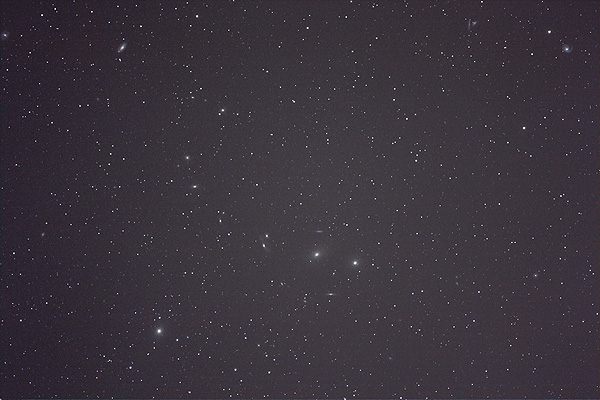
Click on picture to enlarge.
This is Markarian's Chain together with other galaxies in the Virgo Cluster; the brightest is M86.
Three years ago, I photographed this same field
from in town
and got a picture that showed 10 galaxies. I counted at least 23 in this one while processing it,
and that was without looking
thoroughly. The picture has been left rather pale so that you can see the faint "fuzz" that
distinguishes galaxies from stars. Note the striking spiral at the upper right corner.
This is a stack of five 5-minute exposures with a Canon 300-mm lens at f/4 and EOS 40D camera,
from Deerlick. The next two pictures were taken the same way on the same evening (July 7).
Permanent link to this entry
The Cat's Paw Nebula
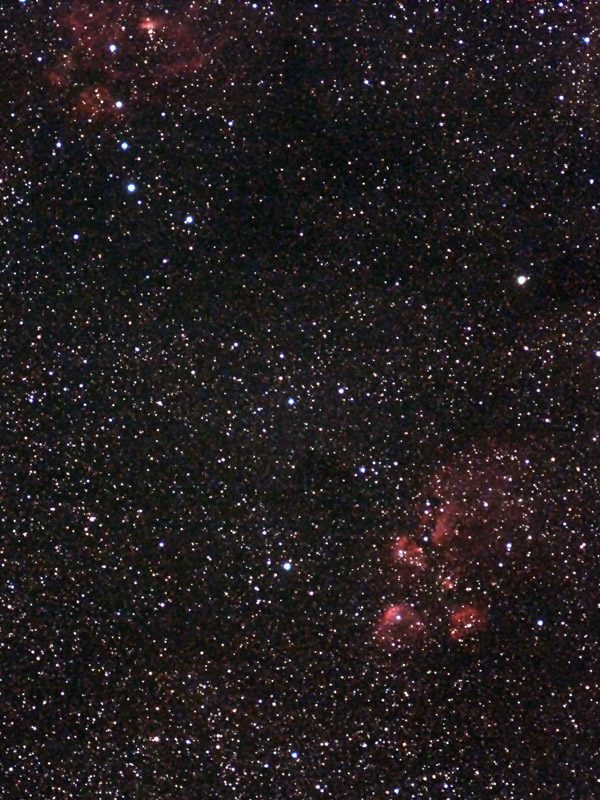
Here you see the Cat's Paw Nebula (NGC 6334) and, at the top, the nebula NGC 6357.
These are gas clouds in Scorpius. Click here
to see a film photograph of the same area that I took several years ago.
Permanent link to this entry
Dark nebulae B92 and B93
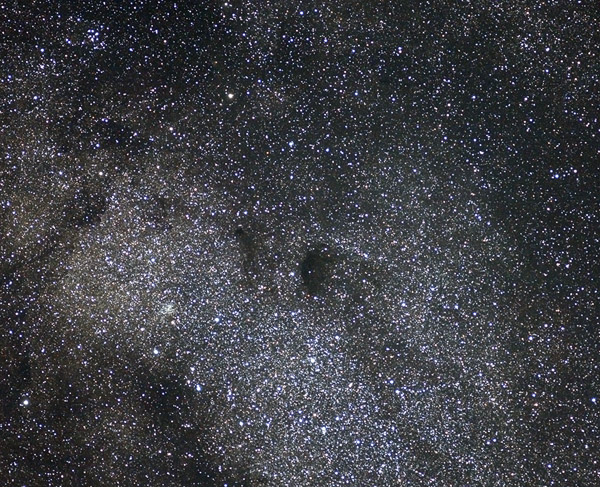
Click on picture to enlarge.
This is a dark-country-sky view of the neighborhood that Pluto is now traversing.
Pluto is one of the starlike objects at the lower right edge of the egg-shaped
dark nebula B92; find it by comparing to yesterday's picture, if you care to make the effort.
Permanent link to this entry


|
2010
July
10
(Extra)
|
Pluto crosses B92
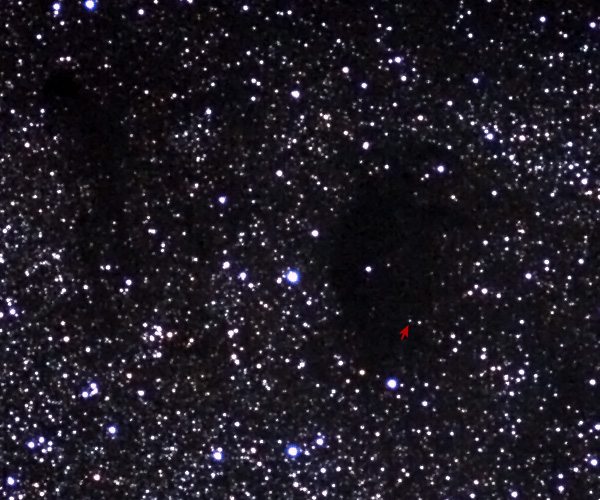
Here you see clouds of stars near the center of our galaxy;
and in front of them, a couple of dark nebulae (dust clouds);
and in front of one of the dust clouds, marked by a red arrow,
the object formerly known as the planet Pluto. Its name is still
Pluto, of course, but not everyone considers it a planet, since we
now know it is just one of a crowd of Kuiper-belt objects.
The dark nebula behind it is B92, discovered
by E. E. Barnard more than a century ago.
I thank Anthony Ayiomamitis for reminding me about Pluto's passage
in front of this nebula. This is a stack of two 5-minute exposures with a 300-mm
f/4 lens and Canon 40D, taken from my backyard in Athens, Georgia.
Permanent link to this entry


|
2010
July
10
(Extra)
|
Nikon Coolscan III LS-30 under Windows 7
I am happy to report that, at least based on experience with one machine,
this Nikon scanner works under Windows 7 with
exactly the same setup as
for Windows Vista.
This is not officially supported by Nikon, of course.
Permanent link to this entry


|
2010
July
10
|
Attached files and pictures are corrupted when receiving mail with Thunderbird
Time out from the astrophotos for a technical matter. But there are more astrophotos coming.
I had this problem with the otherwise excellent Thunderbird 2.0 mailreader; I don't
know if it pertains to Thunderbird 3. And I want to thank Lewis Noles of the University
of Georgia for the solution.
Thunderbird doesn't interoperate properly with some mail servers, including the
University's new one. Attached files and pictures arriving in e-mail are cut short. With JPEG pictures,
this often results in a very blurry picture.
The cure is to go through the menus as follows: Tools, Options, Advanced, General, Config Editor...
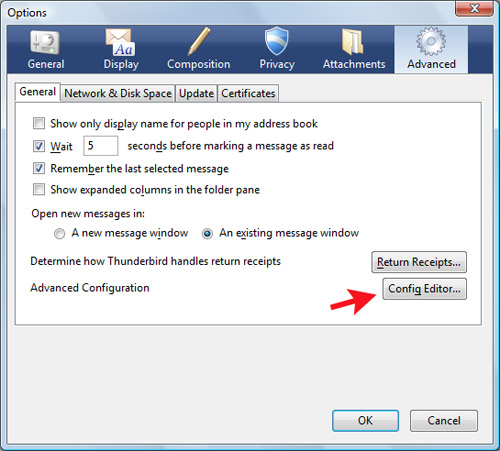
In the Filter frame, type by_chunks and you'll bring up two menu items:
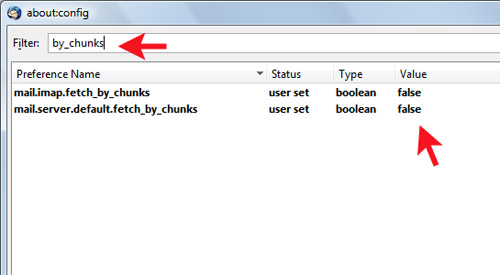
Set them both to false by double-clicking or by right-clicking and choosing Toggle.
Now your files will arrive intact. Files that were already downloaded the wrong way, however,
may remain corrupted; the cure is to retrieve them with a mailreader other than Thunderbird.
Permanent link to this entry


|
2010
July
9
|
The center of our galaxy
Here (also from the evening of July 4) are some pictures of the sky in the direction
of the center of our galaxy. You can see dark nebulae (dust clouds), clouds of stars,
and star clusters. Each is a stack of five 5-minute exposures with an
unmodified Canon 40D, one with a 105-mm f/2.8 lens and the other with a 50-mm lens,
also at f/2.8.
The first picture is a more magnified view of the galactic center; the second picture
zooms out; and the third picture moves north (up). The bright nebula M8 is at the top
of the second picture and the bottom of the third one.

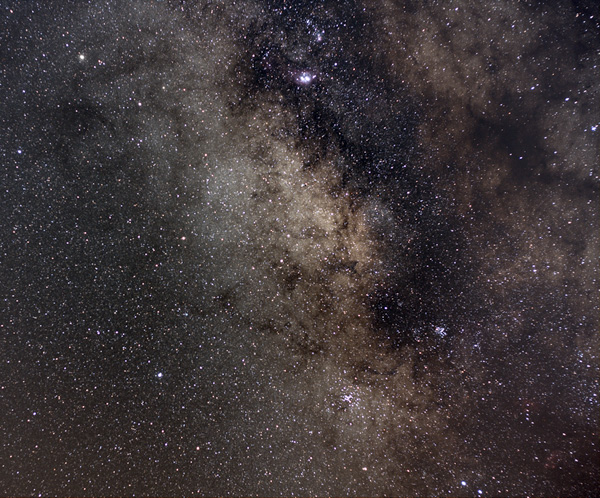
Click on each picture to see a larger image.
And here, using the same 50-mm lens, is a view of star clouds and nebulae (bright and dark) in
northern Sagittarius, slightly north of the region shown in the pictures above.
 Click on the picture to see a larger image.
Click on the picture to see a larger image.
This is the brightest part of the summer Milky Way.
This isn't all. There are still more coming...
Permanent link to this entry


|
2010
July
8
|
Her new Kentucky home
Today, July 8, is Cathy's moving day. She's moving to Lexington, Kentucky,
where she is about to start law school
and is also helping to run a business.
Blue is, of course, the color of the University of Kentucky, and more generally,
a color often used to represent the state as a whole.
Cathy, may God bless the journey you have before you!
There are yet more astrophotos coming — we had a very successful trip to
Deerlick on the night of the 7th. But I have quite a backlog of pictures to process!
More soon.
Permanent link to this entry


|
2010
July
7
|
More soon...
I'll upload more pictures soon. I just took time out from blogging
to photograph Pluto passing in front of a dark nebula which is in
front of a rich star cloud.
Permanent link to this entry


|
2010
July
6
|
Two planets and a false comet
Melody and I drove to Deerlick on three consecutive evenings (July 2, 3, and 4).
The first night, we were clouded out. The second night, we got the pictures you've
seen already. And on the third night, we got several pictures, among them these.
I photographed Venus from Deerlick and Jupiter, with its satellite Ganymede,
from home (at 3:30 a.m.) after getting
back; both were done by recording video through my telescope, then stacking the frames.

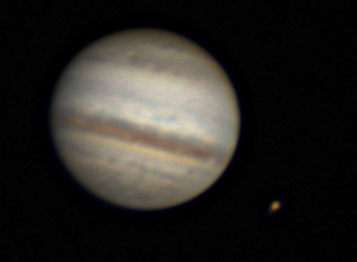
At Deerlick, I used a 105-mm telephoto lens riding "piggyback" on the telescope to take
long exposures of several faint objects. Here you see the "False Comet" in southern
Scorpius. It's a combination of a few bright stars, two star clusters, and a nebula,
which, together, look rather like a comet.
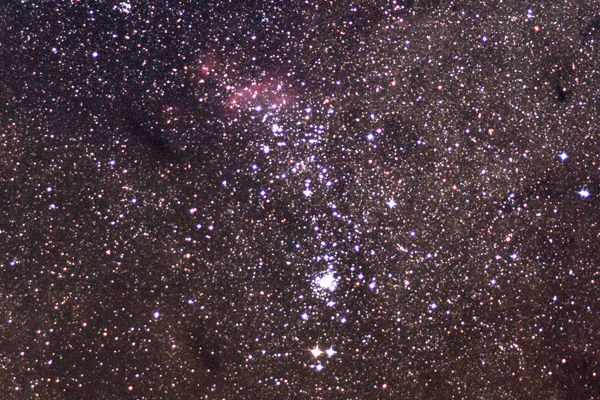
Click on the picture to see a wider field.
Permanent link to this entry


|
2010
July
5
|
Dark nebulae and some [temporary] quibbles with MaxIm DL 5
Here are updated versions of yesterday's pictures of, respectively,
the Rho Ophiuchi region and the Pipe Nebula.


These were processed with MaxIm DL 4, which I heartly recommend.
It has some features I can't do without, such as "Reduce Color Noise"
and "Auto Flatten Background."
[Updated:] Unfortunately, I had some problems with MaxIm DL 5.09: it would no longer
auto-align pictures of rich star fields, and selecting large FITS files
could crash Windows Explorer. These were fixed soon afterward in a later release.
Permanent link to this entry


|
2010
July
4
(Extra)
|
Dark nebulae
Here are a couple of pictures from July 3 at Deerlick.
Both show rich fields of the Milky Way with dust clouds
(dark nebulae).
Each is a stack of five 5-minute exposures with a Canon 40D
and Sigma 105-mm f/2.8 lens piggybacked on my 8-inch telescope.
The field of Rho Ophiuchi, Antares, and M4:
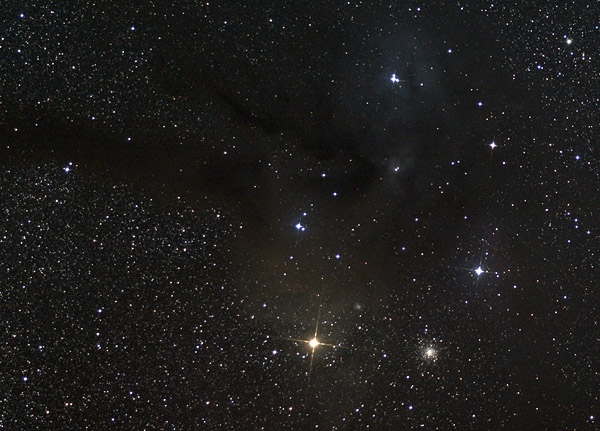
(The bright "star" at the lower right corner of the pentagon is actually
a globular cluster.)
The Pipe Nebula, a distinctively shaped dust cloud:
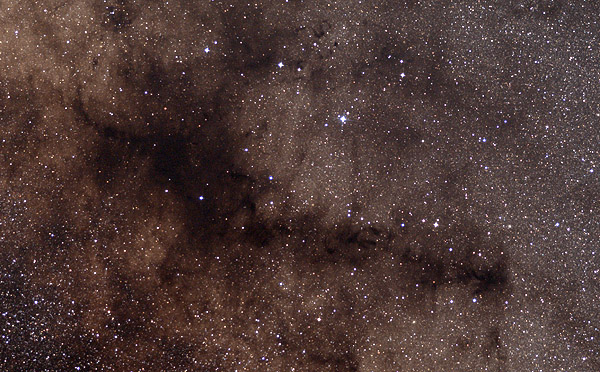
Permanent link to this entry


|
2010
July
4
(Extra)
|
Short notes
What's going on right now is a series of
astronomy expeditions during
a spell of unexpectedly clear, cool weather. Stay tuned for pictures...
In the meantime, here's today's example of metonymic meaning change
("I do not think this word means what you think it means"):
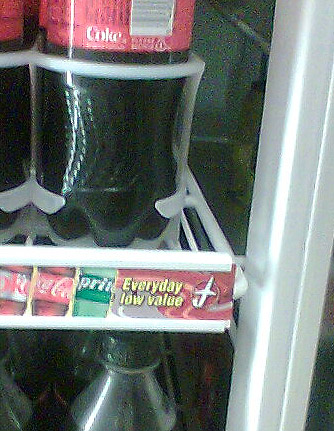
That's right, "Everyday low value." Hmmm... Somebody thought "value" always
meant "bargain," or that it was a nice word to use in marketing and has no
exact meaning.
People with small vocabularies often fall into that trap —
thinking a word sounds nice and forgetting that it means something.
They also fall into the trap of thinking a word is an exact substitute
for another word (if "value" meant "bargain" in one context, that's all it ever means).
I was told of an undergraduate who learned to call black people African-Americans
and proceeded to call Nelson Mandela an African-American (never mind that he's not American).
Hint for Nokia phone owners:
You don't have to install Nokia Suite to get pictures off your phone.
You can get the device driver
by itself.
Happy Independence Day!
Permanent link to this entry


|
2010
July
2-4
|
I'll be back...
The alert reader will have noticed that I'm not writing blog entries right now.
But I'll be back...
Permanent link to this entry


|
2010
July
1
|
People to whom numbers mean nothing
[Revised.]
As I continue to monitor the popular culture of personal finance, it's becoming more evident
to me that there are a substantial number of people walking around who
somehow managed to pass high school mathematics, but never got a feel for the way
numbers represent amounts.
To people like me, numbers represent amounts directly. Without calculating, we see instantly that:
180 is closer to 200 than to 100
40 is twice as much as 20
400 + 900 + 300 is more than 1000
and so forth. But to them, all numbers are like telephone numbers — totally arbitrary.
Whenever you want to know anything
about numbers, you have to put pencil to paper, or use a calculator,
and it is usually far from obvious what calculation to do.
("Do you plus it or do you times it?" as a little girl once asked me.)
Such a person feels that
you must do procedures with numbers in order to get information out of them,
and the procedures are totally arbitrary and have to be memorized.
For the rest of us, the numbers are the information, although
calculation can make them more useful;
when we do calculations, we start out knowing approximately what we're going to get.
A century ago, you could avoid using numbers — at least mostly — by carrying your money
as cash (mostly in bills or coins of one denomination)
and dividing the cash up into bundles for budget categories.
Just look at the size of the bundles, and you know where you stand.
Personal-finance pundits such as Dave Ramsey
and Larry Burkett's organization still advocate the "envelope system,"
running a household with envelopes full of $20 bills.
For a long time I've been trying to understand why some people like this system so much.
The answer? These are people who can't use arithmetic to keep track of amounts on paper.
For them, the envelopes work miracles.
That, or maybe something else: They can't believe that written records represent reality.
Which is it?
Permanent link to this entry


|
|
|
This is a private web page,
not hosted or sponsored by the University of Georgia.
Copyright 2010 Michael A. Covington.
Caching by search engines is permitted.
To go to the latest entry every day, bookmark
http://www.covingtoninnovations.com/michael/blog/Default.asp
and if you get the previous month, tell your browser to refresh.
Entries are most often uploaded around 0000 UT on the date given, which is the previous
evening in the United States. When I'm busy, entries are generally shorter and are
uploaded as much as a whole day in advance.
Minor corrections are often uploaded the following day. If you see a minor error,
please look again a day later to see if it has been corrected.
In compliance with U.S. FTC guidelines,
I am glad to point out that unless explicitly
indicated, I do not receive payments, free merchandise, or other remuneration
for reviewing or mentioning products on this web site.
I have a Canon EOS 20Da camera and a Tektronix
TDS 210A oscilloscope on long-term loan from their manufacturers. Other reviewed
products are usually things I purchased for my own use, or occasionally items
lent to me briefly by manufacturers and described as such.
|
|






 You heard it here first —
the choir of
You heard it here first —
the choir of 

















